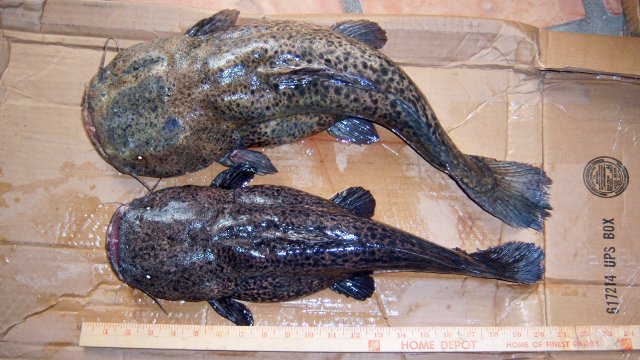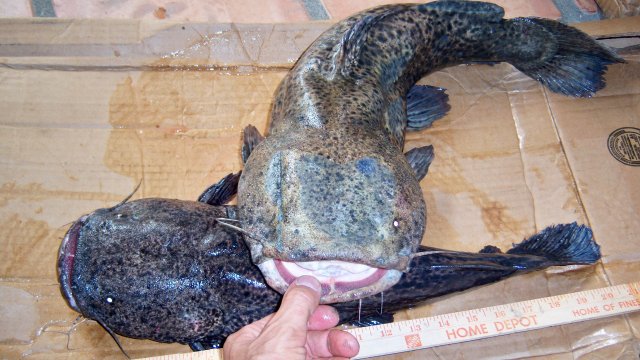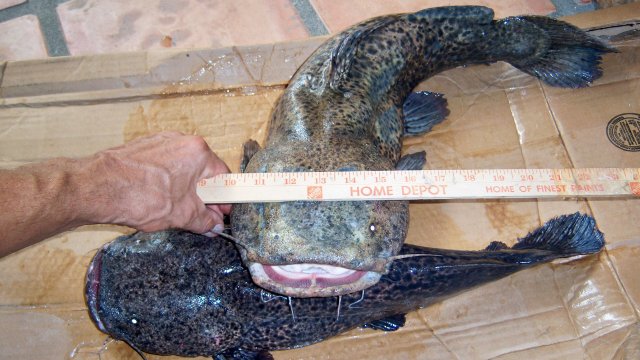The heart break rolls on.
Two more have gone in a similar way to the first apurensis that died, not entirely - no floating and not as long - but other than that all the same. All of the remaining three have been actually sick but two have already passed on and one is still hanging on by a thread.
What happened was they were feeding quite well, as usual, a couple of months ago (they did take a break for a month or two a year ago or so, which worried me, but then returned to their normal greedy selves). They were already taking ~14"-16" mullet whole readily and eagerly and their two last meals were these size mullet, whole and cut in 3-4 pieces. I caught the mullet myself locally. It's been properly frozen for about 6 months.
The mullet wasn't the only feed I have been giving them throughout our time together but various kinds of frozen marine fish and occasionally pellets, which they didn't particularly go after but swallowed some.
Anyhow, they digested the second to the last meal ok 1-1.5 weeks before their last meal but the last one they regurgitated half digested in one day and have been regurgitating mullet backbone vertebra, one or a few at a time, for several days.
Never ate after that growing weaker and now in about two months two have passed on. Epsom salt baths didn't have an effect.
At first I thought that maybe they couldn't digest the thick mullet vertebra, kind of like pelicans can't digest bones of larger fish and die slow and agonizing death but then I remembered that 1 and 2 years ago I would occasionally offer and they would feed on same size mullet and other 1'-1.5' frozen fish (but cut up in rough large pieces as they were smaller). In fact the title of this thread confirms that.
So my second thought is that the diet of 99% frozen marine fish could be what was killing them. Perhaps thiaminase. I should have soaked the feed in Vitachem or stuffed pellets in the feed.
But I thought that malnutrition would not kill that fast and that sudden and would give more time and more symptoms to react to... Wrong????
I don't have any other clues except some wild guesses that maybe just before I caught them the mullets fed on something that's toxic or impassable by the apurensis. But such guesses are fruitless.
Anyone? Kirk Yellowcat
?
V
victor448
- sorry Jeff. The one you just gave me is doing well, no worries. I hope to learn from these deaths, so this guy doesn't meet the same fate. You said you fed it massivore. Now I think it is very wise of you.
Yellowcat
?
V
victor448
- sorry Jeff. The one you just gave me is doing well, no worries. I hope to learn from these deaths, so this guy doesn't meet the same fate. You said you fed it massivore. Now I think it is very wise of you.
The biggest one reached ~22" in the 3 years with us starting from 5", so their growth rate can be not too shabby. Its head and pretty much the mouth too were 6" across. I bought it first of all 4 from George Fear and his Shark Aquarium in Aug 2015 and it came already with one eye. Didn't stop it from growing the boss:



Two more have gone in a similar way to the first apurensis that died, not entirely - no floating and not as long - but other than that all the same. All of the remaining three have been actually sick but two have already passed on and one is still hanging on by a thread.
What happened was they were feeding quite well, as usual, a couple of months ago (they did take a break for a month or two a year ago or so, which worried me, but then returned to their normal greedy selves). They were already taking ~14"-16" mullet whole readily and eagerly and their two last meals were these size mullet, whole and cut in 3-4 pieces. I caught the mullet myself locally. It's been properly frozen for about 6 months.
The mullet wasn't the only feed I have been giving them throughout our time together but various kinds of frozen marine fish and occasionally pellets, which they didn't particularly go after but swallowed some.
Anyhow, they digested the second to the last meal ok 1-1.5 weeks before their last meal but the last one they regurgitated half digested in one day and have been regurgitating mullet backbone vertebra, one or a few at a time, for several days.
Never ate after that growing weaker and now in about two months two have passed on. Epsom salt baths didn't have an effect.
At first I thought that maybe they couldn't digest the thick mullet vertebra, kind of like pelicans can't digest bones of larger fish and die slow and agonizing death but then I remembered that 1 and 2 years ago I would occasionally offer and they would feed on same size mullet and other 1'-1.5' frozen fish (but cut up in rough large pieces as they were smaller). In fact the title of this thread confirms that.
So my second thought is that the diet of 99% frozen marine fish could be what was killing them. Perhaps thiaminase. I should have soaked the feed in Vitachem or stuffed pellets in the feed.
But I thought that malnutrition would not kill that fast and that sudden and would give more time and more symptoms to react to... Wrong????
I don't have any other clues except some wild guesses that maybe just before I caught them the mullets fed on something that's toxic or impassable by the apurensis. But such guesses are fruitless.
Anyone? Kirk
The biggest one reached ~22" in the 3 years with us starting from 5", so their growth rate can be not too shabby. Its head and pretty much the mouth too were 6" across. I bought it first of all 4 from George Fear and his Shark Aquarium in Aug 2015 and it came already with one eye. Didn't stop it from growing the boss:



Last edited:










